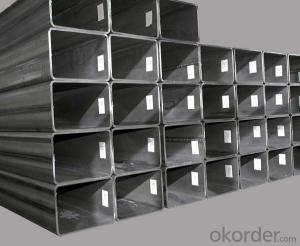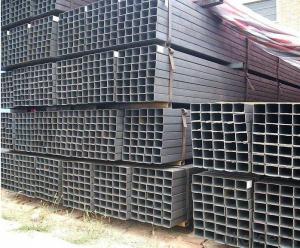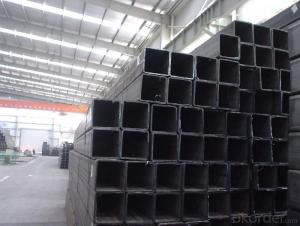Hollow Section-Square Tubes With Best price
- Loading Port:
- Tianjin
- Payment Terms:
- TT OR LC
- Min Order Qty:
- 25 m.t.
- Supply Capability:
- 10000 m.t./month
OKorder Service Pledge
OKorder Financial Service
You Might Also Like
Carbon ERW Welded Pipes-Square Tube And Pipe For Furniture ASTM A53 Hollow Section Details:
| Minimum Order Quantity: | 50MT | Unit: | m.t. | Loading Port: | China Main Port |
| Supply Ability: | based on order | Payment Terms: | TT or L/C |
Product Description:
1. Specification of ERW Welded Pipes-Square Tube and Pipe for Furniture ASTM A53 Hollow Section
1) Application: Greenhouse pipes, scaffolding pipes, transportation the ocean oil and gas, mechanical tube of ocean platform, power station, chemical industry and building, construction foundation piles, steel structure building, for low-pressur fluid service, steel structure bridges etc.
2) Standard: ASTM A53, BS1387, GB/T9711, GB/T39013
3) Steel Grade: Q195/Q215/Q235/Q345
2. Sizes of ERW Welded Pipe- Square Tube and Pipe for Furniture ASTM A53 Hollow Section
Outer Diameter: 1/2"x1/2"-16"x16''
Thickness:4.0-12.75mm
Length: As costumer's requirement
2. Packing & Delivery
Packing Detail: Packing in bundle with steel strips;with seaworthy package at the end; could be done with your requirement
Delivery Time: Within 30 Days after the reception of prepayment or L/C
3. Data Sheet
Standard: ASTM A53
Mechanical Properties
Standard | Grade | (MPa) | (MPa) |
Yield strength | Tensile Strength | ||
ASTM A53M | A | 205 | 330 |
B | 240 | 415 |
Chemical Composition(%)
Standard | Grade | C | Mn | P | S | V | Ni | Cu | Cr | Mo |
Max | Max | Max | Max | Max | Max | Max | Max | Max | ||
ASTM A53M | A | 0.25 | 0.95 | 0.05 | 0.045 | 0.08 | 0.4 | 0.5 | 0.4 | 0.15 |
B | 0.30 | 1.20 | 0.05 | 0.045 | 0.08 | 0.4 | 0.5 | 0.4 | 0.15 |
- Q:What is the maximum temperature and pressure that steel pipes can withstand?
- The maximum temperature and pressure that steel pipes can handle differ based on the specific grade and type of steel utilized. Nevertheless, steel pipes generally have the ability to withstand high temperatures and pressures due to their robust and long-lasting nature. In applications where high temperatures are involved, like in steam or heat transfer systems, steel pipes can typically endure temperatures up to 1000 degrees Celsius (1832 degrees Fahrenheit) or even higher. It is important to note that the exact temperature limit may fluctuate depending on the steel's alloy composition and heat treatment. In terms of pressure, steel pipes are renowned for their exceptional strength and ability to resist internal and external pressure. The maximum pressure that steel pipes can handle will depend on factors such as pipe diameter, wall thickness, and material strength. In industrial applications, steel pipes can handle pressures ranging from a few hundred psi (pounds per square inch) to several thousand psi. To ensure the safe operation of steel pipes under high temperatures and pressures, it is vital to adhere to industry standards and guidelines, as well as conduct regular inspections and maintenance. Seeking advice from engineers and professionals experienced in steel pipe systems can provide more specific information regarding the maximum temperature and pressure limits for a particular steel pipe application.
- Q:How are steel pipes sized and classified?
- Steel pipes are sized and classified based on their outer diameter, wall thickness, and length. The sizing is done using standard measurements such as nominal pipe size (NPS) or nominal diameter (DN). Classification is determined by factors such as the pipe's pressure rating, material composition, and intended use. This helps ensure compatibility and proper installation in various applications such as plumbing, construction, and industrial processes.
- Q:What are the alternatives to steel pipes for various applications?
- There are several alternatives to steel pipes for various applications. Some common alternatives include pipes made from materials such as plastic (polyvinyl chloride or PVC), copper, cast iron, and ductile iron. Each alternative offers different benefits and drawbacks depending on the specific application, cost, durability, and environmental considerations.
- Q:Are steel pipes suitable for use in pharmaceutical industries?
- Yes, steel pipes are suitable for use in pharmaceutical industries. Steel pipes are known for their durability, strength, and resistance to corrosion, making them ideal for transporting various pharmaceutical materials and fluids safely and hygienically. Additionally, steel pipes can withstand high pressure and temperature conditions, ensuring the integrity and efficiency of pharmaceutical manufacturing processes.
- Q:How are steel pipes used in the manufacturing of bicycles?
- Steel pipes are commonly used in the manufacturing of bicycles as they provide strength, durability, and flexibility. They are used to create the frame, handlebars, and other structural components of the bike. The steel pipes are cut, shaped, and welded together to form the frame, providing a sturdy and reliable structure for the bicycle.
- Q:What are the common applications of seamless steel pipes?
- Seamless steel pipes have numerous common applications in various industries due to their unique properties. Here are some of the most common applications of seamless steel pipes: 1. Oil and gas industry: Seamless steel pipes are widely used in the oil and gas industry for the transportation of oil, gas, and other fluids. They are preferred due to their high strength, durability, and resistance to corrosion, making them suitable for harsh environments. 2. Construction and infrastructure: Seamless steel pipes are extensively used in construction projects, including the construction of buildings, bridges, and tunnels. They are ideal for structural applications due to their ability to withstand heavy loads and provide excellent strength and stability. 3. Automotive industry: Seamless steel pipes are a crucial component in the manufacturing of automotive parts, such as exhaust systems, engine components, and hydraulic systems. They offer high strength, reliability, and resistance to heat, making them suitable for demanding automotive applications. 4. Mechanical and engineering applications: Seamless steel pipes find usage in various mechanical and engineering applications, including machinery, equipment, and manufacturing processes. They are commonly used for carrying fluids, gases, and steam, as well as for the transmission of power in machinery. 5. Power generation: Seamless steel pipes are extensively used in power plants for the transportation of steam and hot water. They are capable of withstanding high pressure and temperature, making them ideal for power generation applications. 6. Petrochemical industry: Seamless steel pipes are crucial in the petrochemical industry for the transportation of various chemicals, gases, and liquids. They have excellent resistance to corrosion, which is essential when dealing with hazardous and corrosive substances. 7. Mining industry: Seamless steel pipes are used in the mining industry for various applications, including the transportation of slurry, water, and other mining-related fluids. They offer durability, reliability, and resistance to abrasion, making them suitable for the challenging mining environment. 8. Aerospace industry: Seamless steel pipes find applications in the aerospace industry for manufacturing aircraft components, such as hydraulic systems, fuel lines, and structural parts. They provide high strength-to-weight ratio and resistance to extreme temperatures and pressure. Overall, the common applications of seamless steel pipes span a wide range of industries, thanks to their exceptional properties, including strength, durability, resistance to corrosion and high temperatures, making them an essential component in various industrial processes and infrastructure development.
- Q:How are steel pipes used in the telecommunications sector?
- Various purposes in the telecommunications sector commonly make use of steel pipes. Conduit for underground cable installations is the first purpose served by steel pipes. These pipes ensure the safety of fiber optic cables, which carry data and voice signals over long distances, by providing protection and support. The sturdy nature of steel pipes guarantees that the cables remain secure from external factors like moisture, rodents, and accidental damage. Furthermore, the construction of telecommunication towers and masts involves the use of steel pipes. A strong and durable material is required to bear the weight of antennas, transmitters, and other equipment in these structures. For this purpose, steel pipes are ideal due to their high tensile strength and resistance to harsh weather conditions. Additionally, steel pipes are utilized in the installation of overhead communication lines. These lines are often suspended between poles or towers, and steel pipes serve as supports or brackets to hold the cables in place. The corrosion-resistant properties of steel make it a reliable choice for outdoor installations exposed to various elements. In conclusion, steel pipes play a critical role in the telecommunications sector. They provide protection, support, and durability to cable installations, tower constructions, and overhead communication lines. Their strength and resistance to environmental factors make them an essential component in the establishment and maintenance of reliable telecommunications networks.
- Q:How are steel pipes used in the construction of oil refineries?
- Steel pipes are extensively used in the construction of oil refineries for various purposes. They are primarily used for transporting crude oil, refined petroleum products, and various chemicals within the refinery complex. Steel pipes are also utilized for the distribution of water, steam, and other fluids required for the refining processes. Additionally, they are employed in the construction of equipment such as heat exchangers, reactors, and storage tanks, where they provide structural support and ensure efficient fluid flow. Overall, steel pipes play a critical role in the reliable and safe operation of oil refineries.
- Q:How are steel pipes inspected for quality?
- Steel pipes are inspected for quality through various methods such as visual inspection, non-destructive testing techniques like ultrasonic testing, magnetic particle inspection, and radiographic testing. These inspections help identify any defects, cracks, or imperfections in the pipes, ensuring they meet the required quality standards. Additionally, mechanical tests such as tensile strength and hardness tests may also be conducted to assess the structural integrity of the steel pipes.
- Q:What are the different methods of welding steel pipes?
- There are several different methods of welding steel pipes, including shielded metal arc welding (SMAW), gas tungsten arc welding (GTAW), gas metal arc welding (GMAW), flux-cored arc welding (FCAW), and submerged arc welding (SAW). Each method has its own advantages and is used depending on factors such as the thickness of the pipes, the type of steel being welded, and the desired outcome.
1. Manufacturer Overview |
|
|---|---|
| Location | |
| Year Established | |
| Annual Output Value | |
| Main Markets | |
| Company Certifications | |
2. Manufacturer Certificates |
|
|---|---|
| a) Certification Name | |
| Range | |
| Reference | |
| Validity Period | |
3. Manufacturer Capability |
|
|---|---|
| a)Trade Capacity | |
| Nearest Port | |
| Export Percentage | |
| No.of Employees in Trade Department | |
| Language Spoken: | |
| b)Factory Information | |
| Factory Size: | |
| No. of Production Lines | |
| Contract Manufacturing | |
| Product Price Range | |
Send your message to us
Hollow Section-Square Tubes With Best price
- Loading Port:
- Tianjin
- Payment Terms:
- TT OR LC
- Min Order Qty:
- 25 m.t.
- Supply Capability:
- 10000 m.t./month
OKorder Service Pledge
OKorder Financial Service
Similar products
New products
Hot products
Hot Searches
Related keywords































